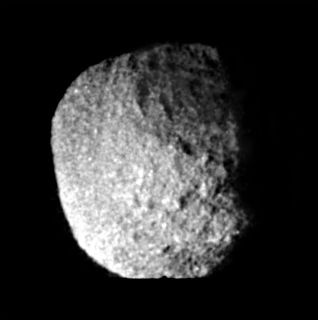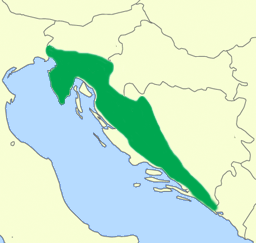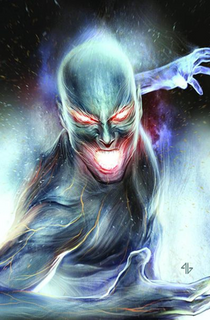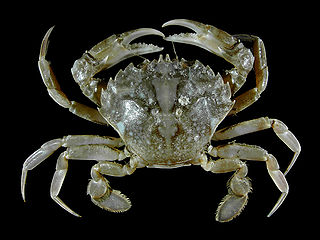
In Greek mythology, Proteus is an early prophetic sea-god or god of rivers and oceanic bodies of water, one of several deities whom Homer calls the "Old Man of the Sea" (halios gerôn). Some who ascribe to him a specific domain call him the god of "elusive sea change", which suggests the constantly changing nature of the sea or the liquid quality of water in general. He can foretell the future, but, in a mytheme familiar to several cultures, will change his shape to avoid having to; he will answer only to someone who is capable of capturing the beast. From this feature of Proteus comes the adjective protean, with the general meaning of "versatile", "mutable", "capable of assuming many forms". "Protean" has positive connotations of flexibility, versatility and adaptability.

Proteus, also known as Neptune VIII, is the second-largest Neptunian moon, and Neptune's largest inner satellite. Discovered by Voyager 2 spacecraft in 1989, it is named after Proteus, the shape-changing sea god of Greek mythology. Proteus orbits Neptune in a nearly equatorial orbit at the distance of about 4.75 equatorial radii of the planet.

Sinbad: Legend of the Seven Seas is a 2003 American animated adventure film produced by DreamWorks Animation and distributed by DreamWorks Pictures, using traditional animation with some computer animation. It was directed by Patrick Gilmore and Tim Johnson, and written by John Logan.

The Two Gentlemen of Verona is a comedy by William Shakespeare, believed to have been written between 1589 and 1593. It is considered by some to be Shakespeare's first play, and is often seen as showing his first tentative steps in laying out some of the themes and motifs with which he would later deal in more detail; for example, it is the first of his plays in which a heroine dresses as a boy. The play deals with the themes of friendship and infidelity, the conflict between friendship and love, and the foolish behaviour of people in love. The highlight of the play is considered by some to be Launce, the clownish servant of Proteus, and his dog Crab, to whom "the most scene-stealing non-speaking role in the canon" has been attributed.

Kevin Sydney is a fictional character appearing in American comic books published by Marvel Comics. The Changeling has been depicted as a member of the X-Men. Created by writer Roy Thomas and artist Werner Roth, the character first appeared in The X-Men #35.

Proteus syndrome is a rare disorder with a genetic background that can cause tissue overgrowth involving all three embryonic lineages. Patients with Proteus syndrome tend to have an increased risk of embryonic tumor development. The clinical and radiographic manifestations of Proteus syndrome are highly variable. Yet, the orthopedic manifestations of the syndrome are unique. The syndrome is named after the Greek sea-god Proteus, who could change his shape. The condition appears to have been first described in the American medical literature by Samia Temtamy and John Rogers in 1976. Michael Cohen described it in 1979. Only a few more than 200 cases have been confirmed worldwide, with estimates that about 120 people are currently alive with the condition. As attenuated forms of the disease may exist, there could be many people with Proteus syndrome who remain undiagnosed. Those most readily diagnosed are also the most severely disfigured.

The olm or proteus is an aquatic salamander in the family Proteidae, the only exclusively cave-dwelling chordate species found in Europe. In contrast to most amphibians, it is entirely aquatic; it eats, sleeps, and breeds underwater. Living in caves found in the Dinaric Alps, it is endemic to the waters that flow underground through the extensive limestone bedrock of the karst of Central and Southeastern Europe, specifically southern Slovenia, the basin of the Soča River near Trieste, Italy, southwestern Croatia, and Bosnia and Herzegovina. Introduced populations are found near Vicenza, Italy, and Kranj, Slovenia.
Proteus is an early Greek water god

Proteus is a genus of Gram-negative Proteobacteria. Proteus bacilli are widely distributed in nature as saprophytes, being found in decomposing animal matter, sewage, manure soil, the mammalian intestine, and human and animal feces. They are opportunistic pathogens, commonly responsible for urinary and septic infections, often nosocomial.

Proteus mirabilis is a Gram-negative, facultatively anaerobic, rod-shaped bacterium. It shows swarming motility and urease activity. P. mirabilis causes 90% of all Proteus infections in humans. It is widely distributed in soil and water.

Demon Seed is a 1977 American science fiction–horror film directed by Donald Cammell. It stars Julie Christie and Fritz Weaver. The film was based on the novel of the same name by Dean Koontz, and concerns the imprisonment and forced impregnation of a woman by an artificially intelligent computer. Gerrit Graham, Berry Kroeger, Lisa Lu and Larry J. Blake also appear in the film, with Robert Vaughn uncredited as the voice of the computer.

The Apple Cart: A Political Extravaganza is a 1928 play by George Bernard Shaw. It is a satirical comedy about several political philosophies which are expounded by the characters, often in lengthy monologues. The plot follows the fictional English King Magnus as he spars with, and ultimately outwits, Prime Minister Proteus and his cabinet, who seek to strip the monarchy of its remaining political influence. Magnus opposes the corporation "Breakages, Limited", which controls politicians and impedes technical progress.
Young Allies is the name of three fictional superhero teams appearing in American comic books published by Marvel Comics.

Kevin MacTaggert, best known as Proteus and also called Mutant X, is a character appearing in American comic books published by Marvel Comics. The character is commonly associated with the X-Men.

In Greek mythology, the Old Man of the Sea was a primordial figure who could be identified as any of several water-gods, generally Nereus or Proteus, but also Triton, Pontus, Phorcys or Glaucus. He is the father of Thetis.

Demon Seed is a science fiction-horror novel by American author Dean Koontz, first published in 1973, and completely rewritten and republished in 1997. Though Koontz wrote both versions and they share the same basic plot, the two novels are very different. The earlier version has a dual narrative, with some chapters written from the perspective of Susan, the story's heroine, and others based on the observations of Proteus, the rogue computer that imprisons her. The later version is written entirely from the point of view of Proteus. A film adaptation of the book was released in 1977.

Two Gentlemen of Verona is a rock musical, with a book by John Guare and Mel Shapiro, lyrics by Guare and music by Galt MacDermot, based on the Shakespeare comedy of the same name.

Proteus appears and is referenced often in popular culture.

Proteus is a 2013 exploration and walking simulator video game created and designed by Ed Key and David Kanaga for Microsoft Windows, OS X, Linux, PlayStation 3 and PlayStation Vita. It allows the player to freely explore a procedurally-generated environment, without predetermined goals. The world's flora and fauna emit unique musical signatures, combinations of which cause dynamic shifts in audio, based on the player's surroundings.

Valentine Rescuing Sylvia from Proteus is an 1851 oil painting by William Holman Hunt. It depicts a scene from William Shakespeare's The Two Gentlemen of Verona. The top left and right portions of the frame include excerpts from act V, scene IV of the play. From left to right, the characters are Julia, disguised as a page, Sylvia, Valentine, and Proteus, who is in love with Julia. Sylvia's father, the Duke of Milain, and a group of followers are present in the background.



















